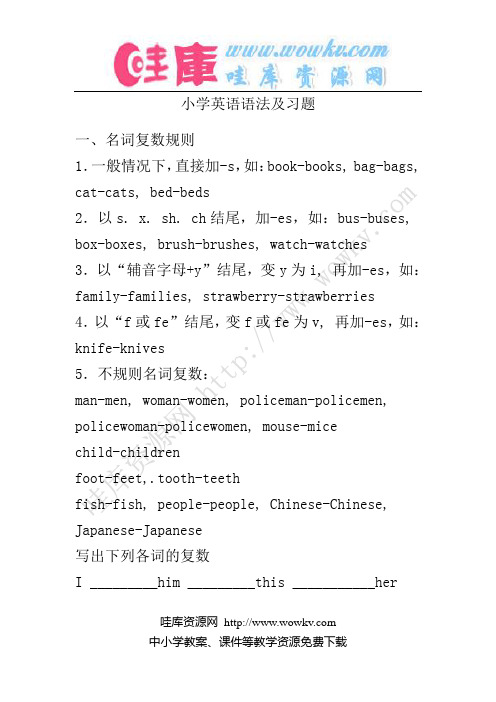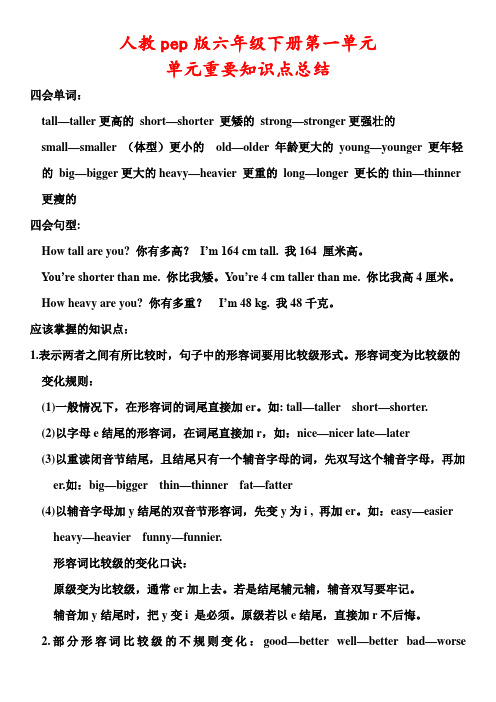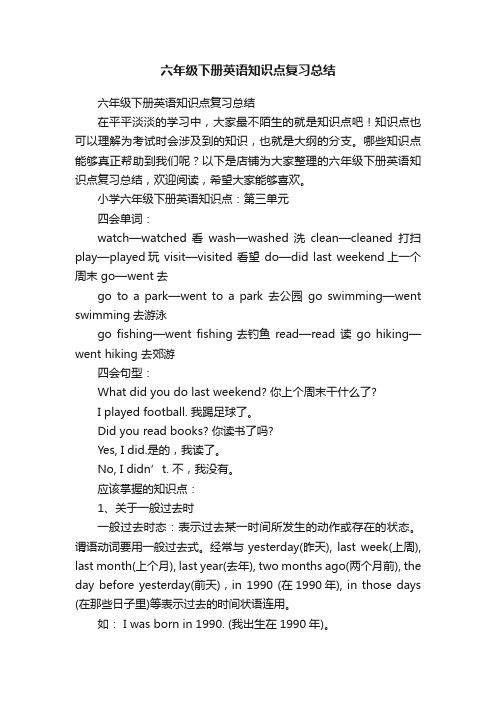六年级下册英语复习知识点
- 格式:wps
- 大小:136.00 KB
- 文档页数:8

小学英语语法及习题一、名词复数规则1.一般情况下,直接加-s,如:book-books, bag-bags, cat-cats, bed-beds2.以s. x. sh. ch结尾,加-es,如:bus-buses, box-boxes, brush-brushes, watch-watches3.以“辅音字母+y”结尾,变y为i, 再加-es,如:family-families, strawberry-strawberries4.以“f或fe”结尾,变f或fe为v, 再加-es,如:knife-knives5.不规则名词复数:man-men, woman-women, policeman-policemen, policewoman-policewomen, mouse-micechild-childrenfoot-feet,.tooth-teethfish-fish, people-people, Chinese-Chinese, Japanese-Japanese写出下列各词的复数I _________him _________this ___________her哇库资源网______watch _______child _______photo ________diary ______day________ foot________ book_______ dress________tooth_______ sheep ______box_______ strawberry _____thief _______yo-yo ______ peach______ sandwich ______man______ woman_______paper_______ juice___________ water________ milk________ rice__________tea__________二、一般现在时一般现在时基本用法介绍【No. 1】一般现在时的功能1.表示事物或人物的特征、状态。

六年级下册英语人教版重点词汇复习资料第一部分tall ----- taller 高的----更高的short ----- shorter矮的/短的----更矮的/更短的long ------ longer 长的----更长的strong------ stronger 强壮的----更强壮的old ------ older 老的/旧的----更老的/更旧的young------ younger年轻的-----更年轻的small------ smaller小的----更小的big-----bigger 大的-----更大的thin-----thinner 瘦的-----更瘦的fat-----fatter 胖的------更胖的happy-----happier 开心的-----更开心的heavy-----heavier 重的------更重的funny-----funnier 滑稽的------更滑稽的wear穿 size号码 tail尾巴shark鲨鱼 deep深的 feet脚seal海豹 killer whale虎鲸sperm whale抹香鲸 squid 鱿鱼than 比 cm厘米 meter 米think想 little小的lobster 龙虾 ton吨tired疲劳的 excited兴奋得angry生气的 sad悲伤的happy高兴得 sore疼得hurt疼痛 bored无聊的feel感觉 sick有病的nose鼻子 know知道worry担心 medicine药drink喝 stay逗留better更好的 soon立刻;不久trip旅行 fail失败have a fever发烧 pass传递have a cold感冒have a sore throat喉咙痛have a toothache牙痛have a headache头痛六年级下册英语人教版重点词汇复习资料第二部分watch ( watched ) 看wash ( washed) 洗clean ( cleaned ) 打扫play (played ) 玩visit (visited)看望do/did 助动词/做cook (cooked ) 做饭go( went ) 去study ( studied ) 学习read ( read ) 阅读fly ( flew ) 飞yesterday ( 昨天)swim (swam) 游泳last 上一个weekend 周末to 朝 ,向park 公园go swimming ( went swimming ) 去游泳go fishing ( went fishing )去钓鱼go hiking ( went hiking ) 去郊游return ( returned) 送回/归还sing sang 唱 eat ate吃go went去 leave left离开take took 拍;照 have had有;吃buy bought买 see saw看见prepare准备 relax放松get got到达go/went ice-skating 去滑冰cousin 堂兄弟;堂姐妹工作I’ll= I will miss想念buy/bought presents 买礼物row/rowed a boat 划船see/saw elephants 看大象go/went skiing 去滑雪learn / learned Chinese学中文take /took pictures 拍照climb/climbed a mountain 爬山sing and dance /sang and danced 唱歌跳舞。

人教pep版六年级下册第一单元单元重要知识点总结四会单词:tall—taller更高的short—shorter 更矮的strong—stronger更强壮的small—smaller (体型)更小的old—older 年龄更大的young—younger 更年轻的big—bigger更大的heavy—heavier 更重的long—longer 更长的thin—thinner 更瘦的四会句型:How tall are you? 你有多高?I’m 164 cm tall. 我164 厘米高。
You’re shorter than me. 你比我矮。
You’re 4 cm taller than me.你比我高4厘米。
How heavy are you? 你有多重?I’m 48 kg. 我48千克。
应该掌握的知识点:1.表示两者之间有所比较时,句子中的形容词要用比较级形式。
形容词变为比较级的变化规则:(1)一般情况下,在形容词的词尾直接加er。
如: tall—taller short—shorter.(2)以字母e结尾的形容词,在词尾直接加r,如:nice—nicer late—later(3)以重读闭音节结尾,且结尾只有一个辅音字母的词,先双写这个辅音字母,再加er.如:big—bigger thin—thinner fat—fatter(4)以辅音字母加y结尾的双音节形容词,先变y为i , 再加er。
如:easy—easierheavy—heavier funny—funnier.形容词比较级的变化口诀:原级变为比较级,通常er加上去。
若是结尾辅元辅,辅音双写要牢记。
辅音加y结尾时,把y变i 是必须。
原级若以e结尾,直接加r不后悔。
2.部分形容词比较级的不规则变化:good—better well—better bad—worsebadly—worse many—more much—more little—less far—farther3.同义句:How tall are you?=What’s your height?How heavy are you?=What’s your weight?4.以How开头的问句(仅限小学阶段):How are you? 问身体状况。

人教版六年级英语下册各单元知识点总结归纳. 短语想做某2 .want to do sth =would to do=feel likedoing岁(年龄)… . … year(s) old 1 事严格/对某人严厉3 .be strict with sb 5. from Monday to ...到...从 .from ...to (4)从星期一到星期五 Friday 在星期一 6. on Monday 例如8. for example …忙碌于 7.be busy(with sth/doing sth) 10.play with sb / … 下课后/放学后/下班后/午饭后.after lunch / work / school / class…9 用于否定句及( any 用于肯定句中)( 11. 7some用某物玩/ 和某人一块儿玩sth 疑问句中)一些句型你最喜爱的学科是什么?1. What‘s your favorite subject? s favorite sth‘sb)”….最喜爱的…“名词,+favorite+(形容词性物主代词我最喜爱的学科是科学。
2. My favorite subject is science. Because it‘s interesting. ?3. Why do you / does she like science? 谁是你的美术教师?4. Who is your art teacher?你什么时候上数学?5. When do you have math?我打排球两个小时。
6. I have volleyball for two hours.时间段)for + (7. What subject do you like best? ---I like math best. ---Her favorite subject is P.E. What‘s her favorite subject?8. -星期二Tuesday星期一Monday星期日Sunday一周名称::三、重点语法Wednesday 星期三星期六Saturday星期五Friday星期四Thursday Unit 3 Can you play the guitar ? 动词原形,它不随主语和数而变化。

小学六年级英语下册知识点
以下是小学六年级英语下册的知识点:
1. 时态:掌握一般现在时、一般过去时、现在进行时、一般将来时等时态的用法。
2. 句型结构:能够运用句型结构进行简单的对话和句子的构建,包括肯定句、否定句、疑问句等。
3. 单词拼写:能正确拼写常用的单词,包括动词、名词、形容词等。
4. 语法:学习并掌握动词的过去式、名词的单复数形式、形容词的比较级和最高级等
基本语法知识。
5. 阅读理解:能够读懂简短的英语文章,并能回答相关问题。
6. 交际用语:学习常用的交际用语,如问候、道歉、请求帮助等。
7. 学科课程:掌握一些与数学、科学、地理等学科相关的词汇和表达方式。
8. 提高听力:通过听录音或者听故事来提高听力能力,能够听懂简单的英语对话和短文。
以上是小学六年级英语下册的一些基本知识点,希望对您有帮助。

六年级下册英语知识点复习总结六年级下册英语知识点复习总结在平平淡淡的学习中,大家最不陌生的就是知识点吧!知识点也可以理解为考试时会涉及到的知识,也就是大纲的分支。
哪些知识点能够真正帮助到我们呢?以下是店铺为大家整理的六年级下册英语知识点复习总结,欢迎阅读,希望大家能够喜欢。
小学六年级下册英语知识点:第三单元四会单词:watch—watched 看wash—washed 洗clean—cleaned打扫play—played玩 visit—visited 看望do—did last weekend上一个周末 go—went去go to a park—went to a park 去公园go swimming—went swimming去游泳go fishing—went fishing去钓鱼read—read 读go hiking—went hiking 去郊游四会句型:What did you do last weekend? 你上个周末干什么了?I played football. 我踢足球了。
Did you read books? 你读书了吗?Yes, I did.是的,我读了。
No, I didn’t. 不,我没有。
应该掌握的知识点:1、关于一般过去时一般过去时态:表示过去某一时间所发生的动作或存在的状态。
谓语动词要用一般过去式。
经常与yesterday(昨天), last week(上周), last month(上个月), last year(去年), two months ago(两个月前), the day before yesterday(前天),in 1990 (在1990年), in those days (在那些日子里)等表示过去的时间状语连用。
如: I was born in 1990. (我出生在1990年)。
When did you go to the park? (你是什么时候去的公园)。
六年级下册英语知识点梳理云林小学李春第一块去年六年级毕业试卷分析第二块六年级下册单元知识点第三块小学阶段考试容易出现的小作文第四块小学阶段四种时态的认识第五块3--6年级常用表达法和单元词汇的整理分享第一块去年六年级毕业试卷分析第一单元Howtallareyou?一、单元重点词汇younger(young的比较级)older(old的比较级)taller(tall的比较级)shorter(short的比较级)longer(long的比较级)bigger(big的比较级)thinner(thin的比较级)smaller(small的比较级)heavier(heavy的比较级)stronger(strong的比较级)(要注意几个特殊变化的单词二、重点句型1、问年龄,身高,体重、鞋码等Howoldareyou--I’m______kg.Howtallareyou--I’m______cmtall.Howheavyareyou--I’m_______(yearsold).Whatsizeareyourshoes?--Iwearsize37.2、比较级句型的掌握…be(amisare)+比较级than…Iam4cmtallerthanyourbrother.我比你弟弟高4cm. Iamtallerandstrongerthanyourbrother.我比你的弟弟更高更壮。
3、所有格句型的掌握Mike’sfishislongerthanSarah’s.第二单元Lastweekend一、重点单词clean打扫--cleaned(clean的过去式)打扫stay停留--stayed(stay的过去式)停留wash洗——washed洗watch看——watched看have患病——had患病sleep睡觉——slept睡觉read读——read读see看见——saw看见last上一个的yesterday昨天before在之前二、短语cleanmyroom打扫我的房间washmyclothes洗衣服stayathome呆在家里watchTV看电视goboating划船readabook读书seeafilm看电影haveacold 感冒sleep睡觉(过去式slept)climbamountain爬山cookeddinner做饭cooknoodles面条三、句子1.Howwasyourweekend你周末过得怎么样?Itwasgood/fine/ok,thankyou.很好,谢谢!2.Whatdidyoudolastweekend你上个周末干了什么?Istayedathomewithyourgrandma.我和你奶奶呆在家里.(with和谁)3.Didyoudoanythingelse你还做了其他什么事吗?Icleanedmyroomandwashedmyclothes.是的,我扫了房间,还洗了衣服。
六年级下册英语知识点归纳Module 1一、单词短语:hamburger 汉堡包cola 可乐juice 果汁dollar 美元cent 美分enjoy 享有,享用restaurant 餐厅menu 菜单cashier 收银员careful 小心旳 look 看上去1、want to do 想要做want sb to do想要某人做want sth 想要2、let sb do 让某人做3、be careful 小心4、in all 一共,总共二、句子:1、--Can I help you? --I want a hot dog,please.2、--How much is it? 多少钱?--It’s thirteen dollars and twenty-five cents.3、What do you want?4、What do you want to eat?5、What do you want to drink?6、It looks good. 它看上去不错。
7、I (don’t) know. 我(不)懂得。
8、Here’s (单数) Here’re (复数) 给你…Here you are .给你可数名词和不可数名词可数名词(可数名词有单数和复数之分。
)数名词用“a/an”表达一种,其中,用an旳名词有:apple , egg , elephant , hour , orange,idea。
s”,规则如下:s eg.book-bookss、x、ch、sh结尾旳,加-es. eg.wish-wishes bus-buses+y结尾旳,变y为i,再加-es. eg.party-partiesf(或fe)结尾旳,去f(或fe),再加-ves. eg. knife-knivessheep—sheep man-men woman-wemenchild-children tooth-teeth foot-feethow many+可数名词复数+其他?”eg.Tom has got two pens. How many pens has Tom got?语法:不可数名词+量词+of+不可数名词”表达数量。
(完整版)六年级下册英语知识点总结六年级下册英语知识点总结第一单元(Unit1 How tall are you?)单词:tall—taller更高的short—shorter 更矮的strong—strong更强壮的old—older年龄更大的young—younger 更年轻的big—bigger更大的heavy—heavier 更重的long—longer 更长的thin—thinne更瘦的small—smaller 更小的dinosaur恐龙hall大厅metre,meter 米than比both 两个都kilogram千克,公斤countryside乡村low—lower更低的shadow阴影,影子smart—smarter更聪明的become开始变得,变成句子:1、That's the tallest dinosaur in this hall.那是这个厅里最高的恐龙。
2、You’re older than me. 你比我大。
3、How tall are you ?你有多高?I’m 1.65 metres.我身高1.65米。
4、What size are your shoes ?你穿多大号的鞋?5、My shoes are size 37. 我穿37号的鞋。
6 、Your feet are bigger than mine .你的脚比我的大。
7、How heavy are you ?你有多重?I’m 48 kilograms .我体重48公斤。
8、It’s taller than both of us togethe r .它比我们俩加在一起还高。
应该掌握的知识点:1、形容词变为比较级的变化规则:(1)一般情况下,在形容词的词尾直接加er。
如: tall—taller short—shorter.(2)以字母e结尾的形容词,在词尾直接加r,如:nice—nicer. late—later(3)以重读闭音节结尾,且结尾只有一个辅音字母的词,先双写这个辅音字母,再加er.如:big—bigger thin—thinner fat—fatter(4)以辅音字母加y结尾的双音节形容词,先变y为i , 再加er。
人教PEP版英语六年级下册各单元知识点Unit 1 How tall are you ?一.必背单词(形容词的比较级)①一般形容词→词尾+ertall —— taller 高的----更高的 short —— shorter 矮的/短的----更矮的/更短的long —— longer 长的----更长的 strong—— stronger 强壮的----更强壮的old —— older 老的/旧的----更老的/更旧的 young—— younger 年轻的----更年轻的 small —— small 小的----更小的 low—— lower 低地----更低地smart——smarter 聪明的 ----更聪明的②以e结尾的形容词→词尾+rlarge —— larger 大的----更大的 late —— later 晚的----更晚的simple —— simpler 简单的----更简单的 safe —— safer 舒服的----更舒服的③以重读闭音节结尾,辅+元+辅→双写最后一个辅音字母+erbig——bigger 大的——更大的 thin——thinner 瘦的——更瘦的fat——fatter 胖的——更胖的 sad ——sadder难过的——更难过的hot——hotter 热的——更热的 wet——wetter 潮湿的——更潮湿的④辅音字母+y 结尾→改 y 为 i +erhappy——happier 开心的——更开心的 heavy——heavier 重的——更重的funny——funnier 滑稽的——更滑稽的 angry——angrier 生气的----更生气的sunny——sunnier 生气的----更生气的 windy——windier 有风的的----更有风的busy——busier 忙的----更忙的 early——earlier 提早的----更早的dinosaur 恐龙 hall 大厅 than 比 both 两个都 meter 米kilogram 千克;公斤size 号码 feet 脚 wear 穿 countryside 乡村 shadow 影子;阴影become 变成;开始变得二.重点句型⑴ 问年龄,身高,体重等How old are you? How tall are you? How heavyare you?--- I’m _______ (years old). --- I’m ______metres tall. ---- I’m ______ kilograms .⑵ 问物品的情况:① How large is your room? 你的房间有多大?It’s ______ m (square meters.) 有___平方米。
一、重要词组及用法1、go + doinggo shopping/bowling/swimming/jogging/running/skating/traveling去购物/打保龄球/游泳/慢跑/跑步/滑冰/旅行My sister often goes swimming at weekendsI went bowling last MondayWe will go jogging this afternoon2、like + doingI like playing tennis ballMy mother likes driving carDoes she like going shopping?3、be interested in + 名词/动名词对……感兴趣Are you interested in reading books?----Yes, I amI am interested in playing chess.4、not only.......but also..... 不但……而且(就近一致原则)Not only my father but also I am interested in playing football.Not only I but also my sister likes jogging5、enjoy oneself 玩的很开心 = have a good(wonderful) timeenjoy doing sth 喜欢干某事 = like doing sthHe enjoys climbingI enjoyed myself yesterday= I had a good time yesterdayMy family enjoyed ourselves last week=My family had a good time last weekDid they enjoy themselves the day before yesterday?= Did they have a good time the day before yesterday?6、be good at+doing sth 擅长于干… = do well in doing sthMy sister is good at studying English=My sister does well in studying EnglishTom is good at playing the piano=Tom does well in playing the piano注意:b e good for:对……有有益(有好处)Reading aloud is good for EnglishUsual Jogging is good for health7、take part in 参加……活动;take an active part in,积极参加……活动Join:参加……组织(团队),并成为其中一员Li Hui takes an active part in all kinds of sportsMy English teacher joined the party three years ago8、spend/take/cost① spend……(in)doing sth(人作主语)某人花了……做某事情spend……on sth 某人花了……在某件事上面I spent a whole day (in) playing games last weekHe spent a lot of time studying EnglishMy sister spent sixty yuan on this coat② take:花费(it作主语)重要句型:It takes(took) sb some time to do sth.做某事情花了某人多少时间It takes me half an hour to go to school on foot every dayIt took us three hours to have a meeting yesterday③ cost:花费(物作主语,某物花了某人多少钱)sth cost sb some money 某样东西花了某人多少钱This book cost me 20 yuan yesterdayThe red coat cost her 100 yuan9、a.m 上午 p.m下午by car 乘小汽车by ship=by sea 乘轮船by air=by plane乘飞机by underground乘地铁My sister often takes a underground to school=My sister often goes to school by underground10、go to the cinema=go to see a film 去看电影My family will go to the cinema two weeks later=My family will go to see a film two weeks later11、in/on/at. 时间从大到小①in: 后接某年、某月和某星期(时间很大、很长)in 1998:在1998年in 2010:在2010年1n January/April/November:在一月/四月/11月in this week:在这个星期三个固定搭配in the morning在上午in the afternoon在下午in the evening在晚上② on: 强调在某一天或者在某一天的上午、下午、晚上(时间比较短)on Monday /Wednesday/Sunday:在星期一/星期三/星期日on Monday morning:在星期一上午;on Sunday evening:在星期日晚上On the afternoon of Thursday:在星期四的下午on a morning of October:在10月的某个上午on an afternoon of December 在12月的某个下午③ at: 在某一个具体的时刻或钟点(时间最小)at seven 在7点 at half past ten 在10点半 at 8:00 在8点固定搭配 at weekends 在周末12、keep in touch with 与某人保持联系Keep in touch with me,please13、would like + to do想要干某事= want to doWould you like to go swimming with me?=Do you want to go swimming with me?He'd like to go to the cinema next saturday=He wants to go to the cinema next satyrday14、How do you like ……? 你认为……怎么样?= what do you think of……?How do you like Mr Zhang?你觉得张先生怎么样啊=what do you think of Mr Zhang?15、how…… = what……like(……怎么样)How was the weather the day before yesterday in Shagnhai?前天上海天气怎么样啊=what was the weather like the day before yesterday in Shanghai?16、why don’t you do ……? 你为什么不……= why not do……?Why don't you go to the cinema with your family?=why not go to the cinema with your family?Why don't you study English hard?= why not study English hard?17、plus(加)、minus(减)、times(乘)、divide by(除)和equal(等于)Fifteen plus eight equals twenty-three (对划线部分提问)How much is fifteen plus eight?Sixteen minus seven equals nine (对划线部分提问)How much is sixteen minus seven?18、on one's way home在某人回家的路上On one's way to school/factory/library19、my pleasure(不用谢,别客气)= It's my pleasure= You are welcomeI'm afraid not!恐怕不行20、How far/how long/how often/how soon的用法区别① how far:多远It is about twenty minutes' walk from here to my home(对划线部分提问)How far is it from here to your home?② How long:多久It took me two hours to finish my homework(对划线部分提问)How long did it take you to finish your homework?③ How often:多久一次(对often/usually/once/twice/seldom/never/sometimes等频度副词提问)I go home once a month(对划线部分提问)How often do you go home?Li Hui usually goes to ShanghaiHow often does Li Hui go to shanghai?④ how soon:多久以后I will go home in a month.(我将在一个月后回家)How soon will you go home ?They will go to Beijing in a weekHow soon will they go to Beijing?21、have to(不得不) ask for(要求)run across the street(穿过街道)22、What's wrong with …? …怎么了?What's wrong with you bike? 你的自行车怎么了?Be more careful 仔细点That's a good idea 好主意That's great 好极了Not really 不太想23、问路程Can you tell me the way to……? 你能告诉我去……的路?=can you tell me how to……?=How can I get to……?Can you tell me the way to the People's Square?=Can you tell me how to go to the People's Square?=How can I get to the People's Square?24、as……as 和……一样(中间用形容词或副词的原型)He is as tall as I 他和我一样高This room is twice as big as that one 这间房子是那间房子的两倍大Tom runs as fast as I 汤姆和我跑的一样快25、be born in…,在………(某某地方)出生(be动词用was/were)I was born in shanghaiAdd to:增加 in the east of…在…东部take a message 捎口信 hold on 请稍等,不要挂电话26、how about(doing )……,……怎么样(好不好)=what about(doing)……How about a cup of tea? 喝一杯茶怎么样啊=what about a cup of tea?How about going swimming? 去游泳好不好啊?=What about going swimming?just now 刚刚soon 不久以后27、a little/little/a few/few① a little: 一点点; little:几乎没有(后接不可数名词)There is a little milk in the glass.在玻璃杯里面有一点点牛奶There is little milk in the glass在玻璃杯里面几乎没有牛奶② a few:一些;few:几乎没有(后接可数名词复数)I have a few interesting story books我有一些有趣的故事书There are few cakes in the fridge,please go to buy some in the supermarket 冰箱里面几乎没有蛋糕了,去超市买一些来28、反义疑问句There is little bread on the desk, is there?桌子上没什么面包了,是吗There are few apples in the basket,are there篮子里面几乎没有苹果了,是吗There is no meat in the fridge, is there?He never goes to school by bike, does he?29、some/any和something/anything① some/any + 不可数名词/可数名词复数Some water/bread/orange some或any books/knives/shelves/wolves② some用于肯定句,any用于否定句和疑问句Li Hui has some knivesDoes Li Hui have any knives?(一般疑问句)Li Hui doesn't have any knives.(否定句)③ some特殊用法:表示建议请求的一般疑问句必须用some,而不能用anyWould you like some apples?May I have some orange?30、something/anything① something相当于some 的用法,即用于肯定句中;anything 相当于any的用法,用于否定句和疑问句中② something/anything important重要的事情Something/anything new新的事情Something/anything interesting 有趣的事情31 many/much 许多Many:后接可数名词复数 many tomatoes/many potatoes/many heroesMuch:后接不可数名词 much rice/much water/much meatHow many + 可数名词复数How much + 不可数名词a lot of:许多,后接可数名词复数,也可接不可数名词a lot of wolves/children a lot of hair/sugar/salt32、used to + do(动词原型), 过去常常My sister used to jog in the morning last yearLi Hui used to go to school by underground some years ago33、play basketball/football/tennis,Play chess(下棋)Play the piano(乐器前面家the)34、How was the weather the day before yesterday in shanghai?前天上海的天气怎么样啊?= what was the weather like the day before yesterday in shanghai?How is the weather today?今天天气怎么样啊=what is the weather like today?35、be proud of:以……自豪My mother is proud of my study36、get ready for= be ready for: 为………做好准备I will get ready for my holiday=I will be ready for my holidayGet ready for climbing that hill,children!37、twelve-year-oldShe is a twelve-year-old girlIt's about twenty minutes' walk38、 Wish sb to do sth:希望某人做某事Help sb do sth= help sb with sthMake/let sb do sth 9(使让动词)Let me help youhelp sb do sth,hope to do sth39、祈使句,动词原形开头Open the door,pleaseDon't open the door,please(变否定句)Open the door,will you?(反义疑问句都一样)40、名词所有格,在名词后面加('s)LiLy's coats 莉莉的外套Student s' books (以s 结尾的复数加',不用再加s)Tom、Lily and Li Hui's classroom: 汤姆和刘慧的教室(两人或多人共同拥有,在最后一个名词后面加's即可)Tom's 、 Li Hui's and Lily's coats:汤姆、刘慧和莉莉的外套(两人或多人分别拥有,即汤姆的外套,刘慧的外套和莉莉的外套)41、动词的三单形式/过去式/现在分词和形容词比较级的构成①总原则是:在词尾加“s”、“ing”、“ed”和“er”②以e 结尾加s、d、r③以辅音字母+y结尾,把y变i再加es、ed和er④以o 结尾加es,tomatoes/potatoes, goes/does⑤以x、s、sh和ch结尾加es,动词三单形式与名词单数变复数相同⑥特殊记忆42、比较级①比较级构成规则,在形容词后面加er② m uch 修饰比较级,表示……得多This apple is much bigger than that one这个苹果比那个苹果大的多Yao Ming is much taller than I姚明比我高的多This coat is much more expensive than that one这件外套比那件外套昂贵的多③比较级和最高级互相变化,需用any other(后接单数,意思是任何其它的一个)Shanghai is the biggest city in china 上海是中国最大的城市=Shanghai is bigger than any other city in china上海比中国任何一个其它城市都大Yao Ming is taller than any other man in shanghai= Yao Ming is the tallest man in Shanghai④ as……as 和……一样That classroom is as big as this one那个教室和这个教室一样大English is as difficult as Maths英语和数学一样难二词形变换1、happy(形容词:高兴的)→ happily (副词:高兴地)2、usual(形容词:经常的)→ usually (副词:经常地)3、real(形容词:真实的)→ really(副词:真实地)4、friend(名词:朋友)→ friendly(形容词:友好地)5、slow(形容词:慢的)→ slowly(副词:慢地)6、quiet(形容词:安静的)→ quietly(副词:安静地)7、heavy(形容词:重的;大量的)→ heavily(副词:沉重地;大量地)8、interest(名词:兴趣、爱好)→ interesting(形容词:有趣的,修饰事物,如:This is an interesting book)→interested (形容词:有兴趣的,固定搭配:be interested in,修饰人 I am interested in playing volleyball)9、 wonder(名词:惊异、惊叹)→ wonderful(形容词:极好的、精彩的)10、fun(名词:娱乐、有趣的人或物)→ funny(形容词:有趣的、滑稽的)11、health(名词:健康, in good health 处于健康状态)→ healthy(形容词:健康的 keep healthy保持健康)12、strong(形容词:强壮的)→ strength (名词:强壮结实)13、science(名词:科学)→ scientist(名词:科学家)14、one(基数词)→ once(频度副词:一次)→ first (序数词:第一)Two(基数词)→ twice(频度副词:两次)→ second (序数词:第二)15、Three → third(序数词:第三)four → fourth(第四)five → fifth(第五)six → sixth(第六)16、know(动词:知道)→ knowledge (名词:知识、学问)17、journal(名词:杂志、日报)→ journalist(名词:新闻记者)18、rich(形容词:富裕的)→ enrich(动词:丰富、充实)19、ease(名词:舒适、悠闲)→ easy (形容词:容易的)20、difficult(形容词:难的)→ difficulty(名词:困难)21、France(法国)→ French(法语;法国人;法国/人的)China(中国)→ Chinese(中国/人的;中国人;汉语)Japan(日本)→ Japanese(日本/人的;日本人;日语)Australia(澳大利亚)→ Australian(澳大利亚人、澳大利亚/人的)America(美国)→ American(美国人;美国/人的)Russia(俄国)→ Russian(俄国人;俄国/人的)Asia (亚洲)→ Asian (亚洲的)Canada(加拿大)→ Canadian(加拿大人、加拿大/人的)England(英国)→ English(英国的;英语)22、different(形容词:不同的)→ difference(名词:不同)23、important(形容词:重要的)→ importance(名词:重要性)24、teach(动词:教、教书)→ teacher(名词:教书)25、friend(名词:朋友)→ friendly(形容词:友好的)26、health(名词:健康)→ healthy(形容词:健康的)27、beauty(名词:美丽、漂亮)→ beautiful(形容词:漂亮的)28、danger(名词:危险)→ dangerous(形容词:危险的)29、attract(动词:吸引)→ attractive(形容词:有吸引力的)30、invite(动词:邀请)→ invitation(名词:邀请/请帖)31、tour(名词:旅行/旅游)→ tourist(名词:旅游者/旅行者)32、direct(动词:指导/指挥)→ direction(名词:指示/说明)33、care(名词:看护/小心)→ careful(形容词:仔细的,小心的)34、以o结尾加estomato(西红柿)→ tomatoes (复数)potato(马铃薯)→ potatoes((复数)hero(英雄)→ heroes(复数35、以fe结尾的名词,把fe变veswife(妻子)→wives(复数)life(生命)→lives(复数)knife(小刀)→knives(复数)wolf(狼)→wolves(复数)themselves,/ourselves/yourselves leaf (叶子)→leaves(复数)36、特殊变化man —men, mouse —mice, foot —feet,woman —women, tooth —teeth, goose —geese,child —children。